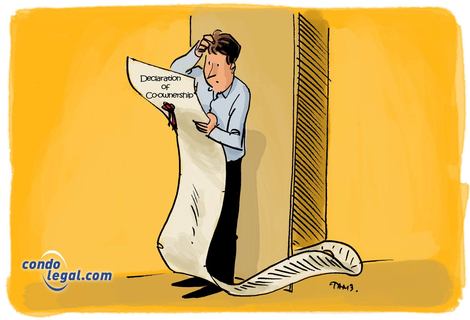 December 31, 2022 – Co-ownership law is in full swing and is currently undergoing a major reform. But what about tacit modifications to the declaration of co-ownership and the building's by-laws? For example, if a co-owner has been using unused space in the garage for more than ten years to store their personal belongings, is he or she allowed to use it indefinitely? Will the person who will eventually purchase their unit also be able to use this space to store their belongings?
December 31, 2022 – Co-ownership law is in full swing and is currently undergoing a major reform. But what about tacit modifications to the declaration of co-ownership and the building's by-laws? For example, if a co-owner has been using unused space in the garage for more than ten years to store their personal belongings, is he or she allowed to use it indefinitely? Will the person who will eventually purchase their unit also be able to use this space to store their belongings?
In December 2019, section 1060 of the Civil Code of Quebec was amended by Bill 16. It is now clear that the "amendments to the by-laws of the immovable must be made expressly, in minutes or in a resolution in writing of the co-owners". Section 157 of Bill 16, which came into force on January 10, 2020, specifies that the amendments made to article 1060 C.C.Q. are declaratory. Consequently, the legislator confirms that it has always been his intention that amendments to the building's by-laws be made expressly and not tacitly.
Despite the above, on February 24, 2020, a decision of the Superior Court muddied the waters in the case of Syndicat des copropriétaires Le Saint-Amable c. Northon[1]. In this case, a real estate developer extended the terraces of certain units onto a roof, well after the declaration of co-ownership had been drafted and without any express modification on this subject thereafter. The defendant purchased two of these units and retained its terraces on the roof of the building. Several years later, the Syndicate wanted it to remove its facilities, a request that was rejected by the court, which considered that the building's by-laws had been tacitly modified during the meetings of co-owners.
It is important to note that in this case, the building's by-laws contained a provision of tolerance towards constructions or structures, subject to a decision of the meeting of co-owners. Moreover, this judgment completely ignores the recent reform and amendment to article 1060 of the Civil Code of Québec. It is therefore not clear that they were analysed by the judge who heard this case. Moreover, the court in a way defined the rights of the co-owner in question by specifying that her rights in relation to her terraces are of a personal nature, and therefore would no longer exist in the event of removal by her and could not be transferred to potential purchasers of her units.
Despite this recent decision, we remain of the opinion that the period of tacit modifications to the building by-laws is over. However, it is only through additional case-law on this subject that we will be able to confirm this. In the meantime, as noted by Christine Gagnon, notary emeritus, in her recent article Les décisions tacites en copropriété[2], « la prudence est donc de mise d’ici à ce que les tribunaux reviennent sur cette question ». It is strongly recommended that directors, syndicates and co-ownership managers do not delay in taking action to stop co-owners when they act against the building's by-laws, in order to avoid this inaction being perceived as a tacit modification to these by-laws.
Yves Joli-Coeur, Ad. E.
Lawyer
Dunton Rainville
3055 Boulevard Saint-Martin O
Bureau 610
Laval, QC H7T 0J3
Tél. : (450) 686-8683
Courriel : [email protected]
Chronic express the personal opinions of the author and in no way engage the responsibility of the site editor , CondoLegal.com Inc. The content and opinions expressed in a column are those of the author.
[2] Les décisions tacites en copropriété, Me Christine Gagnon, notaire émérite, Bulletin spécial coronavirus, 3e édition

